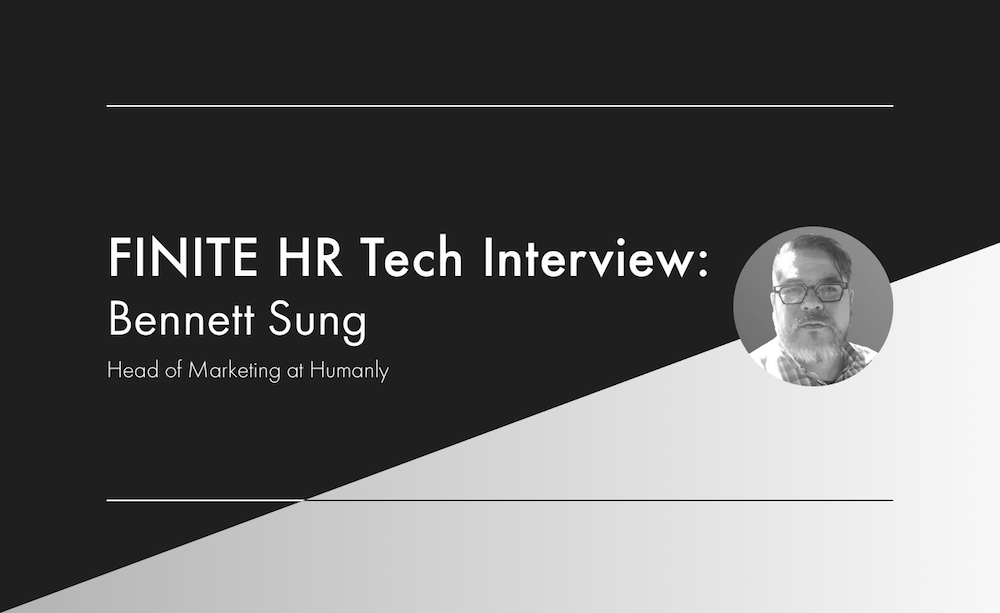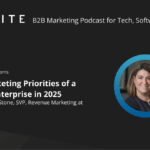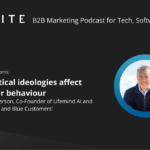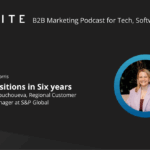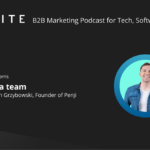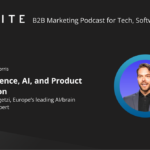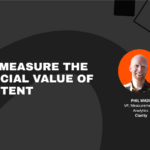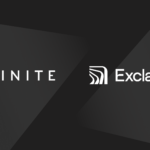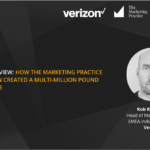You might have noticed that HR Tech companies have similar branding. They tend to serve the risk-compliant HR audience, and have become homogenised in a competitive environment.
How does an HR Tech marketer get their solution to stand out?
In our final edition of the FINITE HR Tech Interview Series, we talked to Bennett Sung, Head of Marketing at Humanly – an HR Tech company that automates candidate screening, scheduling and engagement. Bennett has over 20 years experience in HR Tech marketing, so he has a unique view of the landscape with valuable insights.
This interview covers:
- Why the homogenisation of branding occurs, particularly in HR Tech
- How it impacts buyer decision making
- What buyers need to facilitate their buying process
- How to differentiate HR Tech messaging
FINITE: Hi Bennett! Firstly, could you tell us more about your past experience in HR Tech and about your current role as Head of Marketing at Humanly?
Bennett: Sure. As a tech-empowered marketer, I aspire to launch and develop purpose-driven brands that delight customers and simplify work for everyone.
My employer branding and HR tech marketing career spans over 20 years. Anchored in Consumer Behaviour studies, I’m laser focused on crafting messaging and campaigns through the voice of the customer. Each career journey layers in different experiences and growth mindset, and teaches me “every company is a snowflake, and it is the organisation’s brand voice that serves as the unique differentiator and attention grabber.”
Reflecting upon my first three months as Humanly.io’s Head of Marketing, I’ve realized it’s the culmination of my past three employers — Koru (talent assessments), AllyO (recruitment automation), and Avoma (conversation intelligence). I am excited to collaborate with the Humanly.io team on brand development and activation, coupled with building the foundation for solid product, customer marketing and demand generation behaviors at scale.
FINITE: You mentioned that one of the biggest challenges in HR Tech marketing right now is homogenised branding and messaging across competitors. Why do you think HR Tech in particular has homogenised messaging and branding?
Bennett: Here are my observations around why HR Tech marketing is homogenised and vanilla:
- A Brand is an emotional connection you establish with prospects and customers. In HR Technology, we are targeting an ideal customer profile who serves as a risk/compliance management partner. Emotions imply opinions, suggesting potential bias – the red zone for our HR and Talent Acquisition persona. Perceived risky and scary, HR Technology brands steer clear versus lean-in on the colourful side of emotion.
- HR Technology solution providers tend to be the jack of all trades — being everything to everyone. You see it in the human-visuals used across all marketing assets. You see it in their unfocused market strategy, going after all industry verticals. You see it in their products where functionality is a mile wide and just an inch deep.
- The lack of differentiators and clarity on solving a specific need leads to ambiguous positioning and messaging, resulting in high levels of uncertainty in the mindset of the buyer.
FINITE: How does similar messaging and branding impact buyer decision making?
Bennett: Conducting win-loss interviews is a mission critical service to the business. I’ve heard more than 50% of lost opportunities voiced a “no decision” more frequently than “went to the competition“ As further explored their feedback, undifferentiated products were the top reason for their “no decision”.
Simply examine the company positioning of interview intelligence providers. Would you be able to quickly identify the following brand associated with company positioning?
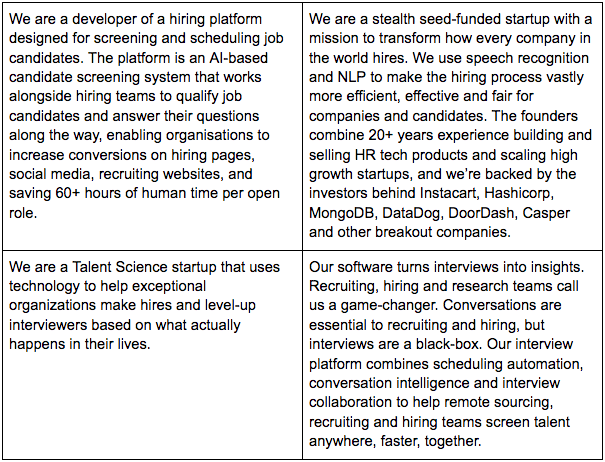
Crafting differentiated messaging empowers buyer researchers to fill out their checklist effectively. Have you ever wondered how many times your company was not invited to sales process? In fact, it is a bold move for an HR Tech company to enlist a ghost author, who happens to also be an industry analyst, to deliver a product comparison article or the best of request for a proposal template. This approach will empower the researcher to make the right decision on next steps in the purchasing lifecycle.
FINITE: What do buyers need to facilitate their research process?
Bennett: No doubt buyers lean on messaging to help drive the research phase of their purchasing process. They seek answers to the obvious — “what functionality does your solution provide?”, “what use cases does your solution solve for?” and “how it works.” When all solution providers say they “hire faster or smarter or now even fairer,” buyers have no baseline to score, compare, and shortlist the solutions that best meet their needs.
It’s the differentiators (e g proprietary technology, founders background, experience, pricing transparency, social proof) that facilitates the knowledge buyers need.
FINITE: What are the steps you take to differentiate your branding and messaging from competitors?
Bennett: When building out your brand strategy, here are essential steps you will need to take to build out differentiated messaging:
- Conduct primary research of your 10-15 closed won vs and closed-lost customers. I follow the methodology of the Buyer Persona Institute.
- Capture competitive intelligence on messaging and other brand attributes like colour, fonts, website navigation, etc.
- Work with leadership to create the Target Problem Statement and Strengths & Benefits chart.
- Down select 3-5 differentiators (or reasons to believe) from your Strength and Benefits chart.
- Develop your positioning statement around this formula:
- Target Audience Job Title + Your Brand + Benefit Promise + 3-5 Reasons To Believe + End Reward
FINITE: Thanks Bennett, for giving us some tactical advice on differentiating an HR Tech brand from competitors!
To read the last FINITE HR Tech interview and to learn more about SEO for an HR audience, head here.
